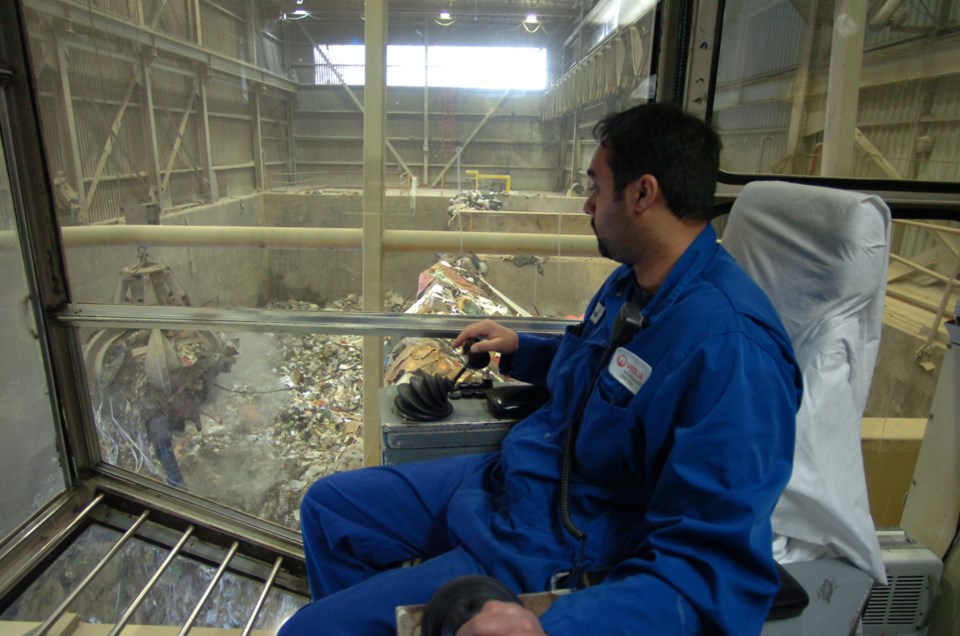The Fraser Valley Regional District says it's taking Metro Vancouver's permit renewal process as a chance to impede the Burnaby incinerator's operation, unless better environmental standards are met.
The operating certificate is part of a series of initiatives that will update the condition under which the facility operates. In 2011, the Ministry of Environment completed a technical review of municipal solid waste thermal treatment practices, which resulted in requiring Metro Vancouver to apply for a permit by the end of 2013. The B.C. ministry will make a decision based on the application and the comments that were solicited as part of the process.
"While the ministry has not made a decision on the operating certificate, it expects this will lead to more stringent standards for the facility to operate under," said David Karn, of the Ministry of Environment. "There is no deadline for the ministry to make a decision on the operating certificate."
However, the Fraser Valley Regional District is crying foul on how there was little time to make a comment and a lack of publicity on the matter, according to Patricia Ross, vice-chair of the district.
"We've always been pretty clear in opposing burning garbage in this airshed at all, we don't think it's a viable waste management strategy," she said. "Garbage is so complex, so unpredictable. There's thousands and thousands of chemicals in the waste ... you put all the toxins together and it forms what's called a super toxin. It's complex and unpredictable."
The district represents 300,000 residents, including agricultural and tourism agencies. For the last several years, it has amplified its concerns about having the Burnaby waste-to-energy facility share the same airshed with its region, which grows much of the province's produce, Ross says.
"I'm not sure if we were informed or found out by accident," she noted about the permit process. "It took us by surprise. We had to drop everything, and it was all hands on deck. Given the time limitations, I think staff did an outstanding job."
The district sent in a 51-page report complete with a letter outlining the district's multitude of concerns when it comes to the waste-to-energy facility, including requirements such as a better website, soil, water, vegetation, food, fauna and human monitoring programs, air pollution control devices, and emergency generator information, among others.
In the letter, the district asked the Ministry of Environment and Metro Vancouver to deliver a presentation to it and the general public, which would address questions and concerns on the operating certificate issuance process, the discharge limits, monitoring and best management practices, and any modelling work that may have been done.
Ross also charges that the waste-to-energy facility does not meet international environmental standards.
"Ultimately, on our wish list, we want them to forget about building a new (incinerator) and shut down the Burnaby one," she said. "At the very least, the province has to do better enforcing than what Burnaby is proposing in its operational certificate. If they rubber stamp it as is, I will be extremely disappointed."
The district has tried on many occasions to meet with Metro Vancouver to discuss the issue, but is frustrated by the lack of consultation, she added.
"You should be sitting down with the people affected, your neighbours, and say, 'This is what we're thinking of doing, what do you think?' But all it's ever been is, 'This is what we're doing, like it or lump it,'" Ross said.
Metro Vancouver board chair Greg Moore also told the NOW it's been a challenging relationship with the sister district, but for different reasons.
"They've made a lot of assertions and a lot of demands," he said. "We're trying to have conversations and discussions with our colleagues there, but unfortunately they only want to have the conversation in the media or through the media, and not actually with us."
Moore defended the incinerator's upgrades, and noted that Metro Vancouver has poured $60 million into new technology over the last 26 years the facility has been open.
"Fraser Valley also has come out with assertions that most air quality emissions come from Metro Vancouver, which is true as the majority of the population lives in Metro Vancouver," he said. "But if you look at it, our residents produce 40 kilograms of emissions a year, their residents produce about 70 kilograms. Our air quality work that we're doing is far superior to anyone around us."
Moore noted that Metro Vancouver's waste-to-energy facility is a better solution, as landfill produces 21 times more greenhouse gases compared to incinerators, "and the FVRD has three landfills leaching into the water system."
Paul Henderson, Metro Vancouver's solid waste general manager, echoed Moore's comments about keeping the incinerator in top shape.
"There's a series of work that's underway and in planning stages," Henderson told the NOW. "There's work underway to reduce the NOx (nitrogen oxide) ... it's part of the operational certificate requirements."
NOx is a byproduct of combustion, and can also come from cars. The waste-to-energy facility emits .9 per cent of all the NOx emitted in the region but a current upgrade aims to cut that number down to .4 per cent.
"It's a substantial reduction in the amount of NOx generated in the facility and it's something that will be in place in 2014," he added. "The amount of particulates coming out of the facility, it's so low it equates to 140 kilograms per year for particulates ... (or) .001 per cent particulates emitted in the airshed. It's reduced substantially over the years."
Henderson added the Fraser Valley Regional District's comments are one of eight sets of comments that were submitted from "a variety of entities."
"We haven't gone through the FVRD's comments, but we have all of those comments," he added. "We've committed, by the end of this month, to go through all the comments and provide responses. It's possible some comments ... will be valid and are things that should be incorporated in the operational certificate."



